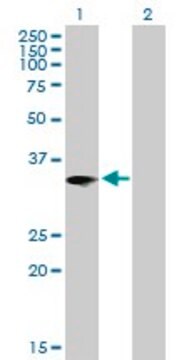I3642
Monoclonal Anti-Interleukin-1β antibody produced in mouse
clone 8516.311, purified immunoglobulin, lyophilized powder
Synonym(s):
Anti-IL-1β
Sign Into View Organizational & Contract Pricing
All Photos(1)
About This Item
Recommended Products
biological source
mouse
Quality Level
conjugate
unconjugated
antibody form
purified immunoglobulin
antibody product type
primary antibodies
clone
8516.311, monoclonal
form
lyophilized powder
species reactivity
human
technique(s)
flow cytometry: suitable
immunohistochemistry: 8-25 μg/mL using human PBMC′s
neutralization: suitable
western blot: 1 μg/mL
isotype
IgG1
UniProt accession no.
storage temp.
−20°C
target post-translational modification
unmodified
Gene Information
human ... IL1B(3553)
Specificity
The antibody will neutralize the biological activity of recombinant human IL-1β. It will not neutralize the activity of recombinant human IL-α, recombinant mouse IL-1α, or recombinant mouse IL-1β. When immobilized on a microplate, this antibody will capture both recombinant as well as natural human IL-1β. In immunoblotting, the antibody shows ~25% cross-reactivity with recombinant rat IL-1β and <5% cross-reactivity with recombinant mouse IL-1β and recombinant porcine IL-1β. Additionally, in immunoblotting, the antibody exhibits no cross-reactivity with recombinant mouse IL-α, recombinant human IL-1ra, recombinant mouse IL-1ra, or recombinant rat IL-1α.
Immunogen
purifed, E. coli-derived, recombinant human IL-1β.
Application
May used in immunoblotting, immunohistochemistry, ELISA, and neutralization assays
Physical form
Lyophilized from a 0.2 μm filtered solution in phosphate buffered saline with 5% trehalose.
Preparation Note
Monoclonal Anti-Interleukin-1(IL-1) (mouse IgG1 isotype) is purified from a mouse hybridoma utilizing Protein A affinity chromatography.
Disclaimer
Unless otherwise stated in our catalog or other company documentation accompanying the product(s), our products are intended for research use only and are not to be used for any other purpose, which includes but is not limited to, unauthorized commercial uses, in vitro diagnostic uses, ex vivo or in vivo therapeutic uses or any type of consumption or application to humans or animals.
Not finding the right product?
Try our Product Selector Tool.
Storage Class Code
13 - Non Combustible Solids
WGK
WGK 2
Flash Point(F)
Not applicable
Flash Point(C)
Not applicable
Choose from one of the most recent versions:
Already Own This Product?
Find documentation for the products that you have recently purchased in the Document Library.
Ludmila Alekseeva et al.
BMC microbiology, 9, 33-33 (2009-02-12)
Aspergillus fumigatus, a saprophytic mould, is responsible for life-threatening, invasive pulmonary diseases in immunocompromised hosts. The role of the airway epithelium involves a complex interaction with the inhaled pathogen. Antimicrobial peptides with direct antifungal and chemotactic activities may boost antifungal
Paul A Cordell et al.
Blood, 115(13), 2674-2681 (2010-01-21)
Factor XIII-A (FXIII-A) is present in the cytosol of platelets, megakaryocytes, monocytes, osteoblasts, and macrophages and may be released from cells by a nonclassical pathway. We observed that plasma FXIII-A levels were unchanged in thrombocytopenic mice (Bcl-x(Plt20/Plt20) and Mpl(-/-)), which
Constanze Csaki et al.
Biochemical pharmacology, 75(3), 677-687 (2007-10-26)
The inflammatory process plays a pivotal role during the pathogenesis of osteoarthritis, dominated by catabolic processes initiated by pro-inflammatory cytokines such as IL-1beta. Resveratrol, a natural phytoalexin occurring in various fruits has previously been shown to exhibit anti-inflammatory properties in
Melanie Genoula et al.
Frontiers in immunology, 9, 459-459 (2018-03-30)
The ability of Mycobacterium tuberculosis (Mtb) to persist in its human host relies on numerous immune evasion strategies, such as the deregulation of the lipid metabolism leading to the formation of foamy macrophages (FM). Yet, the specific host factors leading
Rosario García-Vicuña et al.
Arthritis and rheumatism, 50(12), 3866-3877 (2004-12-14)
To explore the potential involvement of the chemokine system in synoviocyte-mediated tissue destruction in rheumatoid arthritis (RA), we studied the expression profile of chemokine receptors and their function in the migration, proliferation, and matrix metalloproteinase (MMP) production of cultured fibroblast-like
Our team of scientists has experience in all areas of research including Life Science, Material Science, Chemical Synthesis, Chromatography, Analytical and many others.
Contact Technical Service







